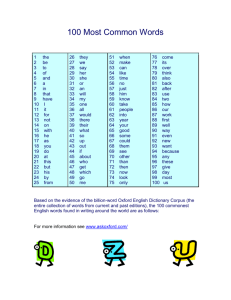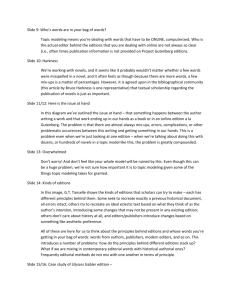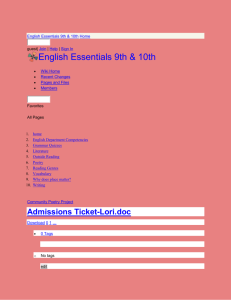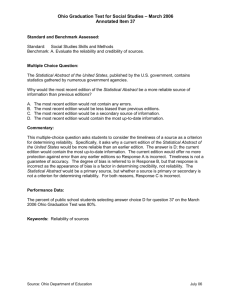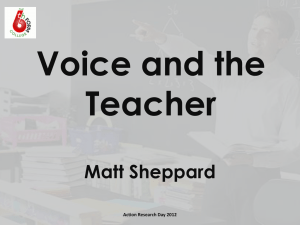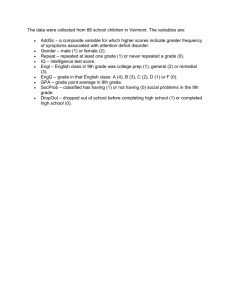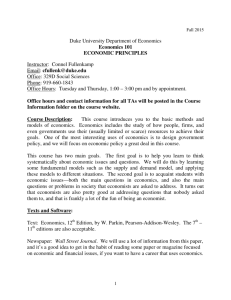ECON 101. Economic Principles, Connel
advertisement
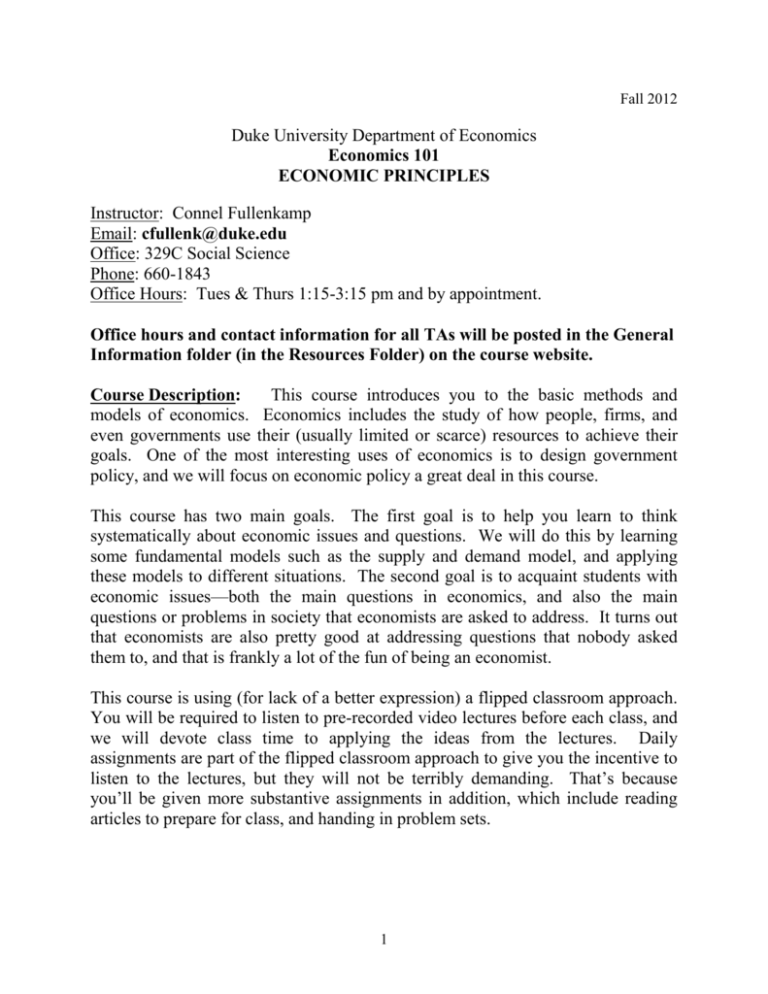
Fall 2012 Duke University Department of Economics Economics 101 ECONOMIC PRINCIPLES Instructor: Connel Fullenkamp Email: cfullenk@duke.edu Office: 329C Social Science Phone: 660-1843 Office Hours: Tues & Thurs 1:15-3:15 pm and by appointment. Office hours and contact information for all TAs will be posted in the General Information folder (in the Resources Folder) on the course website. Course Description: This course introduces you to the basic methods and models of economics. Economics includes the study of how people, firms, and even governments use their (usually limited or scarce) resources to achieve their goals. One of the most interesting uses of economics is to design government policy, and we will focus on economic policy a great deal in this course. This course has two main goals. The first goal is to help you learn to think systematically about economic issues and questions. We will do this by learning some fundamental models such as the supply and demand model, and applying these models to different situations. The second goal is to acquaint students with economic issues—both the main questions in economics, and also the main questions or problems in society that economists are asked to address. It turns out that economists are also pretty good at addressing questions that nobody asked them to, and that is frankly a lot of the fun of being an economist. This course is using (for lack of a better expression) a flipped classroom approach. You will be required to listen to pre-recorded video lectures before each class, and we will devote class time to applying the ideas from the lectures. Daily assignments are part of the flipped classroom approach to give you the incentive to listen to the lectures, but they will not be terribly demanding. That’s because you’ll be given more substantive assignments in addition, which include reading articles to prepare for class, and handing in problem sets. 1 Texts and Software: Text: Economics, 7th, 8th, 9th or 10th Edition, by M. Parkin, Pearson-AddisonWesley. Newspaper: Wall Street Journal. We will use a lot of information from this paper, and it’s a good idea to get in the habit of reading some paper or magazine focused on economic and financial issues, if you want to have a career that uses economics. Software: There will be required exercises to complete in MyEconLab for nearly every each class period, and you must subscribe to this service in order to do the exercises. A spreadsheet such as Excel is a very useful piece of software to use to think about economics and business. You should start to learn how to use a spreadsheet, and some of the problem sets in the course will help you do this by requiring you to use a spreadsheet. We will also use Sakai to deliver many outside readings and course information: https://sakai.duke.edu Requirements: This course will have 3 lectures per week, MWF 1:25 – 2:40 pm. There will not be official sections, though there will be weekly sections that will cover specific problems on problem sets. Attendance to these is voluntary. The TAs will hold office hours each week, with the purpose of answering your questions about the lectures and giving help on the problem sets. The graded work in the course will consist of online exercises related to the video lectures and readings, problem set assignments, and timed, in-class exams. Online Exercises: There will be a set of online exercises due at the start of each lecture in which new material is covered. These exercises will be worth 30 points total, which will be worth about four percent of the possible points in the course. 2 Problem Sets: The purpose of the problem sets is to give you some practice with the concepts and models that we will be covering in the course. Doing the problem sets will be your best preparation for the exams. To encourage you to do the problem sets, they will be collected and scored, but only for completeness. It will be your responsibility to compare your problem set answers to the answers posted on the course website. (Hint: make a copy of your answers before you turn them in so that you can compare your answers right away.) Problem sets will generally (but not always) be due on Mondays, at the start of class. If you miss the deadline to submit a problem set, you MAY NOT make it up, under any circumstance. That includes illness or anything else you can submit a STINF for, by the way. But you may collaborate on problem set answers and you are allowed to copy someone else’s problem set answers and hand them in as your own, or have a friend hand in a copy of their problem set answers on your behalf. You must STAPLE your problem sets together, and write your name LEGIBLY in BLOCK CAPITALS in a prominent place on the first page. You will lose up to 2 points per problem set (out of 5) for not doing these things. I encourage you to work in groups on your problem sets, but each student must have their own copy of the problem set handed in. Problem sets will be worth 40 points total. This is just under 5% of the possible points in the course. Exams: There will be 3 exams in this course. The exams are your chance to show independently that you understand and can use the concepts and models studied in this course. The first two exams will be worth 200 points each. The third exam will be a comprehensive and will be worth 400 points. Exam Schedule The following dates are reserved for exams: Wednesday, September 19 and Friday, September 21 Monday, October 22 and Wednesday, October 24 3 Monday, November 12, Wednesday, November 14, Friday November 16, and Monday, November 19. Late Work and Missed Exam Policy Late problem sets will not be accepted. Missed problem sets may not be made up. Because of the size of the class, no makeup exams will be given. If you miss a midterm and obtain a University excuse for having done so, you may shift the weight of the missed midterm onto the other midterm(s). If you miss more than one midterm for any reason, you will have to have a special conference with me and your academic dean to determine whether you should continue in the course. And be advised: my position will be to have you withdraw from the course in such a circumstance. Grade Insurance Policy In this course, I offer a grade insurance policy to all students. If you satisfy the following requirements, you will earn no less than a C- (C-minus) final grade in the course: • Complete all online exercises by their due dates • Hand in all problem sets at the correct time and place • Complete all exams for the course (including any practice exams given in class) in such a way that demonstrates that you put honest effort into completing the exam, judging by both the raw score as well as the details of the answers you enter on the free-response section of the exam If you fail to satisfy any of these requirements completely, you will lose the insurance. My judgement regarding the honest effort criterion will be final. Statute of Limitations If you miss an exam, you have up to 48 hours after the exam to contact me in some way to let me know that you have or will be bringing me a University excuse for the absence from the exam. If you do not meet this deadline, you will automatically receive a 0 on the exam missed. You have one week from the date the exam is officially handed back (midnight of the seventh day following the day the exam was handed back) in which to petition 4 to have the grading on all or part of your midterm exam reconsidered. After that deadline, no petitions for reconsideration will be accepted. Petitions to reconsider scores on first two exams If you believe that your score on an exam was incorrect or that you should receive more credit for your work, you must write up a petition stating your case and submit this petition in writing to the Head Graduate TA for the course by the statute of limitations deadline. Please note that there will be no re-grading for the third exam. In your petition, you must describe specifically and carefully why you believe that your answer deserves more credit than it has been awarded. If there has been a simple addition mistake when your score was calculated, all you need to write on your petition is “Mistake in adding up the total score.” Please be advised that legalistic and generally snotty write-ups of regrade petitions are not likely to score as well as objectively argued and clearly written arguments. Append your petition to the original copy of your exam answers and submit it to the Head TA. The Head TA will make a ruling on the petition and notify both you and me of the status of the petition. I will accept appeal petitions only—you must petition the Head TA first, and after your petition has been reviewed by the Head TA and returned to you, you have the option to appeal to me. You must write an additional appeal petition, appended to the exam plus original petition, that explains exactly why you believe that the Head TA’s ruling was not appropriate. You have 48 hours after you have been notified (by email) that the petition is ready to be picked up in order to submit your appeal. Please note: The entire exam may be regraded if it is submitted for reconsideration, even on appeal. Note on Course Meetings: This course is scheduled to meet three times per week for 75 minutes, rather than 50 minutes. This is to accommodate commitments I have that require me to be out of town. Because the course meets three times per week for 75 minutes, we will significantly exceed the minimum required contact hours for a full-credit Duke course. 5 Duke University's Academic Honor Code I. The Duke Community Standard Duke University is a community of scholars and learners, committed to the principles of honesty, trustworthiness, fairness, and respect for others. Students share with faculty and staff the responsibility for promoting a climate of integrity. As citizens of this community, students are expected to adhere to these fundamental values at all times, in both their academic and non-academic endeavors. The Pledge Students affirm their commitment to uphold the values of the Duke University community by signing a pledge that states: 1. I will not lie, cheat, or steal in my academic endeavors. 2. I will conduct myself responsibly and honorably in all my activities as a Duke student. 3. I will act if the Standard is compromised. The Reaffirmation Upon completion of each academic assignment, students will be expected to reaffirm the above commitment by signing this statement: “I have adhered to the Duke Community Standard in completing this assignment.” [Student Signature] II. Definitions Lying is the expression of a material untruth made with the intent to mislead another or with reckless disregard for the truth of the matter asserted. The material untruth may be uttered or presented, verbally, electronically, or in writing, to another member of the University community (student, faculty or staff). An untruth is material when it relates to or affects in a significant way activities of legitimate concern to the University community. Cheating is the act of wrongfully using or attempting to use unauthorized materials, information, study aids, or the ideas or work of another in order to gain an unfair advantage. It includes, but is not limited to: • • • • • • plagiarism; giving unauthorized aid to another student or receiving unauthorized aid from another person on tests, quizzes, assignments or examinations; using or consulting unauthorized materials or using unauthorized equipment or devices on tests, quizzes, assignments or examinations; using any material portion of a paper or project to fulfill the requirements of more than one course unless the student has received prior permission to do so; intentionally commencing work or failing to terminate work on any examination, test, quiz or assignment according to the time constraints imposed; or failing to adhere to an instructor’s specific directions with respect to the terms of academic integrity or academic honesty. “Plagiarism” occurs when a student, with intent to deceive or with reckless disregard for proper scholarly procedures, presents any information, ideas or phrasing of another as if they were his or her own and does not give appropriate credit to the original source. Proper scholarly procedures require that all quoted material be identified by quotation marks or indentation on the page, and the source of information and ideas, if from another, must be identified and be attributed to that source. Students are responsible for learning proper scholarly procedure. The term "assignment" includes any work, required or volunteered, and submitted to a faculty member for review and/or academic credit. All academic work undertaken by a student must be completed independently unless the faculty member or other responsible authority expressly authorizes collaboration with another. 6 Stealing is the intentional taking or appropriating of the academic work product of another without consent or permission and with the intent to keep or use the academic work product without the owner's or the rightful possessor's permission. Responsible and Honorable Conduct means adhering to state and federal laws, residential and academic regulations, and the policies of Duke University as explicated in the Bulletin of Information and Regulations of Duke University. III. Students’ Obligation to Report Potential Cases of Academic Dishonesty. Under the Duke Community Standard, students affirm their commitment not to lie, cheat, or steal in academic endeavors, nor accept the actions of those who do. The university recognizes that it is not always easy to act in these situations, but several alternatives are available to suit a student’s level of comfort and confidence. These alternatives are not mutually exclusive. • Speaking directly with the individual exhibiting the behavior, both to gain clarity about the situation and to inform the individual about the concern. • • Publicly calling attention to the behavior as it is occurring. • Directly alerting the Associate Dean for Student Conduct within the Dean of Students Office (919-684-6938, conduct@duke.edu), who will confer with the faculty member involved, if an academic issue, or with the reporting student(s), strategizing next steps. Maintaining the confidentiality of the source is possible, but may limit the extent of action that can be taken. For cases involving academic integrity, alerting the instructor that cheating may be occurring in the course. This alert can be in any form, including anonymous notification, and the reporting student will not be identified. The information provided will allow the faculty member to consider corrective measures, in consultation with the Associate Dean for Judicial Affairs, and to address the topic with the class or suspected student(s). To this standard, I add the following comments: • Any kind of conduct that shows lack of academic integrity, or lack of respect for others’ rights to learn and be graded fairly, is a Code violation. • Any attempt to gain an unfair advantage over fellow students on any graded exercise is a Code violation. If you are unsure about the use of any form of aid, ask me about it before you use it. • The most serious type of academic dishonesty is handing in someone else's work and claiming that it is your own. This includes, in the context of essay writing, plagiarism. It also includes collaborating, even with a student who is not in this course or section, on any graded work that is supposed to be done independently. Please note that I permit and encourage you to work in groups on your problem sets. All exams are to be done independently. If I do not specify, you are to assume that you must work independently. 7 I believe that you are honest. Nevertheless, if I see evidence of any breach of academic integrity, I will confront it according to the procedures described in the Bulletin of Duke University. And While We’re on the Subject of Academic Honesty and Student Conduct As part of this course, you will be asked to watch a series of pre-recorded video lectures. These lectures are copyrighted material. You are permitted to download one copy of the set of video lectures on the condition that you agree not to distribute the lectures further, in whole or in part, ever. That includes, by the way, sampling any audio or video content from the lectures and mixing it into other content you create yourself. And as implied above, this agreement survives the end of this course. 8 Rough Schedule of Topics and Readings PART ONE: INTRODUCTION TO ECONOMICS; MICROECONOMICS 1. Introduction to Economics (1 session) Reading Assignment: Parkin, Chaper 1, including Appendix on graphing. (Same for all 4 editions) 2. A Simple Model of Scarcity and Opportunity Cost (2 sessions) Reading Assignment: Parkin, Chapter 2 except for the Gains from Trade section. (Same for all 4 editions) 3. Microeconomics, Focusing on the Supply Side (2 sessions) Reading Assignment: Parkin, Chapters 9-10 (7th and 8th editions); Chapters 10-11 (9th & 10th editions). 4. The Supply and Demand Model (1 session) Reading Assignment: Parkin, Chapter 3. (Same for all 4 editions) 5. Elasticity, the Economist’s Friend (1 session) Reading Assignment: Parkin, Chapter 4. (Same for all 4 editions) 6. Supply and Demand in Related Markets (1 session) 7. Government Intervention in Markets (1 session) Reading Assignment: Parkin, Chapters 5 and 6.(Same for all 4 editions) FIRST MIDTERM EXAM OVER THE ABOVE MATERIAL 8. Long-Run Competitive Equilibrium (1 session) Reading Assignment: Parkin, Chapter 10 (7th and 8th editions); Chapter 11 (9th & 10th editions). 9 PART TWO: MACROECONOMICS AND MACRO POLICY ANALYSIS 9. Measuring the Macroeconomy (1 session) Reading Assignment: Parkin, Chapters 20-22 (7th and 8th editions);Chapters 21-22 (9th & 10th editions); Chapter 30, pp. 707-716 (7th edition only); Chapter 29 (8th, 9th , and 10th editions) 10. The Aggregate Demand – Aggregate Supply Model (2 sessions) Reading Assignment: Parkin, Chapter 23 (7th edition); Chapter 27 (8th, 9th, and 10th editions). 11. The Goods Market and Fiscal Policy (1 session) Reading Assignment: Parkin, Chapter 29 (7th edition); Chapter 28 (8th and 9th editions), Chapter 30 (9th & 10th editions). 12. The Financial Market’s Role in the Economy and Monetary Policy (1 session) Reading Assignment: Parkin, Chapters 26-27 (7th edition); Chapter 25 and Chapter 31 (8th, 9th, and 10th editions). 13. Using Fiscal and Monetary Policy (2 sessions) Reading Assignment: Parkin, Chapters 31-32 and Chapter 28 (7th edition); Chapters 30-31 and Chapter 29 (8th, 9th, and 10th editions); Chapter 24 (9th & 10th editions). SECOND EXAM OVER THE ABOVE MATERIAL PART THREE: INTERNATIONAL ECONOMICS 14. Trade Theory and International Trade (2 sessions) Reading Assignment: Parkin, Chapter 2 “Gains from Trade” section (all 4 editions); Chapter 33 (7th edition); Chapter 32 (8th edition), Chapter 7 (9th & 10th editions). 10 15. International Finance: Capital Flows and Exchange Rates (2 sessions) Reading Assignment: Parkin, Chapter 34 (7th edition); Chapter 26 (8th, 9th, and 10th editions) PART FOUR: LONG-RUN GROWTH 16. Long Run Growth: The Solow Growth Model (2 sessions) Reading Assignment: Parkin, Chapter 25 (7th edition); Chapter 24 (8th edition); Chapter 23 (9th & 10th editions). COMPREHENSIVE EXAM OVER ALL THE MATERIAL 11
